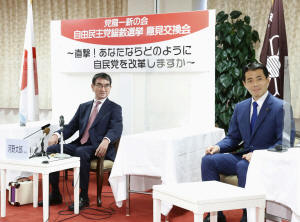Junior Japanese lawmakers emerge as force in wide-open PM race
 Send a link to a friend
Send a link to a friend
 [September 27, 2021]
By Elaine Lies [September 27, 2021]
By Elaine Lies
TOKYO (Reuters) - A group of junior
lawmakers has emerged as a force to be reckoned with in Japan's ruling
party leadership contest, facing off with party barons in the wide-open
race for votes on Wednesday, which will also determine the premiership.
Many of the 90-strong members of the grouping, who rode into power on
the coat-tails of former prime minister Shinzo Abe, fear losses in a
general election within months of the leadership race, and chafe at
party customs, including the weakening but still present grip of old
guard factions.
"There's no transparency in how they operate, no explanation," lawmaker
Keitaro Ohno, 53, one of the founders of the Group for Renewing Party
Spirit, told Reuters, referring to the established factions.
"Even if we can operate pretty freely, when it comes time for leadership
races and big party events, we're told from the top 'hey you guys, look
right'. If you ask 'why right?', they'll say 'Just listen to me. If I
say it's right, it's right.' This isn't good."
Though similar groups have formed throughout the history of the ruling
Liberal Democratic Party (LDP), this one appears to be having an impact.

Due to its pressure, party barons have ruled that members of the formal
factions can vote as they wish on Wednesday.
All four candidates for party leader - who will almost certainly become
prime minister as leader of the biggest party in parliament - also
joined a debate with the group's top members, apparently looking to win
backing.
Though analysts believe many members of the group will choose vaccine
minister Taro Kono, it isn't endorsing any candidate.
Ohno supports former foreign minister Fumio Kishida - who has talked
about party reform, including term limits.
The old party factions have lost influence since reforms in the 1990s
when they were banned from funding candidates, leaving that solely to
party headquarters. Now they mostly jostle for cabinet and party posts.
'ENERGETIC'
Though Ohno said party elders can have useful experience, and factions
can be helpful, voters tell him and others they're increasingly
distrustful of old-style politics, characterised by backroom deals, like
the way Prime Minister Yoshihide Suga was chosen last year.
Members of the group say they have to take the initiative to win over
voters.
"I hear talk that our ability to communicate is weak, that we have to do
what the elders want," said Arata Takebe, a 51-year-old Hokkaido
lawmaker, in a video on his website.
[to top of second column]
|

A candidate for the presidential election of the ruling Liberal
Democratic Party (LDP), Taro Kono, the cabinet minister in charge of
vaccinations, meets with LDP lawmaker Tatsuo Fukuda during their
discussion meeting in Tokyo, Japan September 21, 2021, in this photo
taken by Kyodo. Picture taken September 21, 2021. Mandatory credit
Kyodo/via REUTERS

"If the younger members aren't energetic the LDP
isn't appealing. That's why we have this group."
Rebels they're not. Many, including Ohno and Takebe, are second- or
third-generation politicians. Group leader Tatsuo Fukuda, 54, is the
son and grandson of prime ministers.
Many have corporate experience like Ohno, an ex-researcher at
electronics firm Fujitsu who held a fellowship at a U.S. university.
They also matured after Japan's economic bubble burst, which Ohno
said means they don't take things for granted.
"Younger Diet members feel like they have nothing to do, they're cut
out, they haven't earned their service time so they have to be quiet
and just do what they're told, and who likes that?" said Tobias
Harris, senior fellow at the Center for American Progress.
The pressure of an imminent general election - one has to be held by
Nov. 28 - has given the younger politicians leverage for change,
Harris said.
"The circumstances of this election gave them an opening which
they've used to weaken factional control over the outcome."
Ohno, who has not identified himself with any of the party's old
factions, hopes his group can fulfil what he says are widespread
voter hopes for a more contemporary political system.
"That means breaking away from the Showa-era style of political
management," he said, referring to the period from 1926-1989,
corresponding with the reign of Emperor Hirohito. "And,
modernisation."

(Reporting by Elaine Lies; Editing by Robert Birsel)
[© 2021 Thomson Reuters. All rights
reserved.] Copyright 2021 Reuters. All rights reserved. This material may not be published,
broadcast, rewritten or redistributed.
Thompson Reuters is solely responsible for this content. |